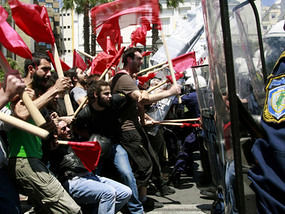
Europe is likely to see intermittent protests over the summer against painful economic measures, impacting markets but much tamer than the violent unrest in Greece that sent jitters through southern Europe.
Long regarded as the most prone to street violence in western Europe — as well as the most financially troubled — Greece has seen several angry protests culminating in clashes early last month, that left three dead in a burning bank. Analysts say in southern Europe in particular, street protests are likely to recur periodically, but the main concern is whether governments rethink austerity measures as a result.
“There are going to be protests and people are going to try to torch banks from time to time,” said Eurasia Group analyst Jon Levy. “It is going to be occasional and far from the sort of thing that will bring society crashing down. But it will get a lot of media coverage and that means it may well have market impact.”

Insurer say they have seen a notable uptick in inquiries about political risk cover — which protects against expropriation, political violence and exchange controls — particularly for Portugal and Spain as they face stringent cuts.
RISK GREATEST IN CAPITAL CENTERS
That could marginally push up the cost of doing business in those countries.
“The main risk is going to be in capital city centers where you have a risk of protest,” said Daniel Riordan, head of political risk at insurers Zurich.
But he said the increase had been limited to the southern euro zone with Ireland — usually included in the list of troubled economies with Portugal, Italy, Greece and Spain — not a big worry for investors at this stage.
Ireland was the first euro zone country to significantly slash public spending, mollifying markets and initially prompting severe street protests. More recent protests have been on a much smaller scale, if albeit occasionally violent, and analysts say the population has largely acquiesced to the cuts.
Analysts say there is also a modest chance of social unrest in Britain as it pushes through what policymakers say will be some of the toughest cuts since the Second World War. But again, any industrial action is expected to be limited and much lower key than union unrest and poll tax riots in the 1980s.
RELATED ARTICLES
- Ireland finally gets rid of its Leftist Prime Minister
- Spanish Priest Faces Up To 3 Years In Prison For Criticizing Islamic Extremism
- EU conservative leaders Meet in Romania for Reelection and Victory lap
- EU Approves Digital ID, Greece Becomes First to Adopt the Law
- Egyptian gunman shoots dead 3 ex-coworkers at Greek shipping company











